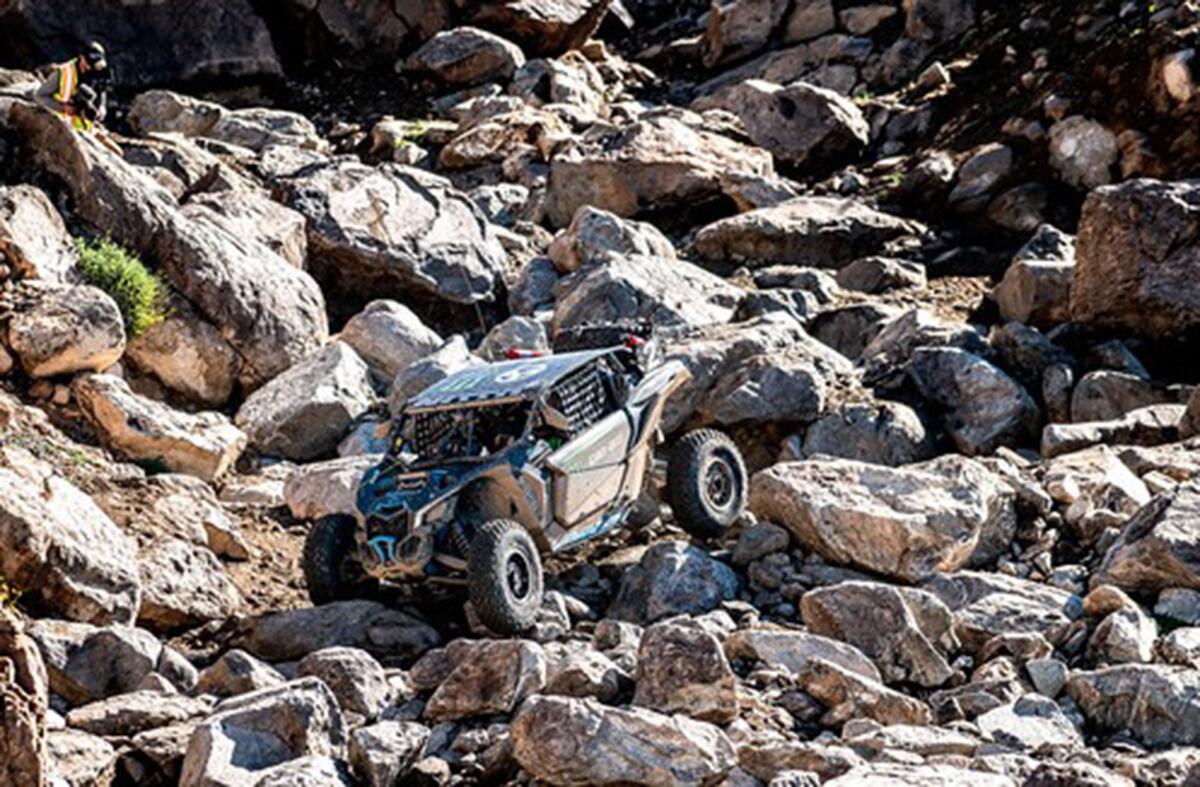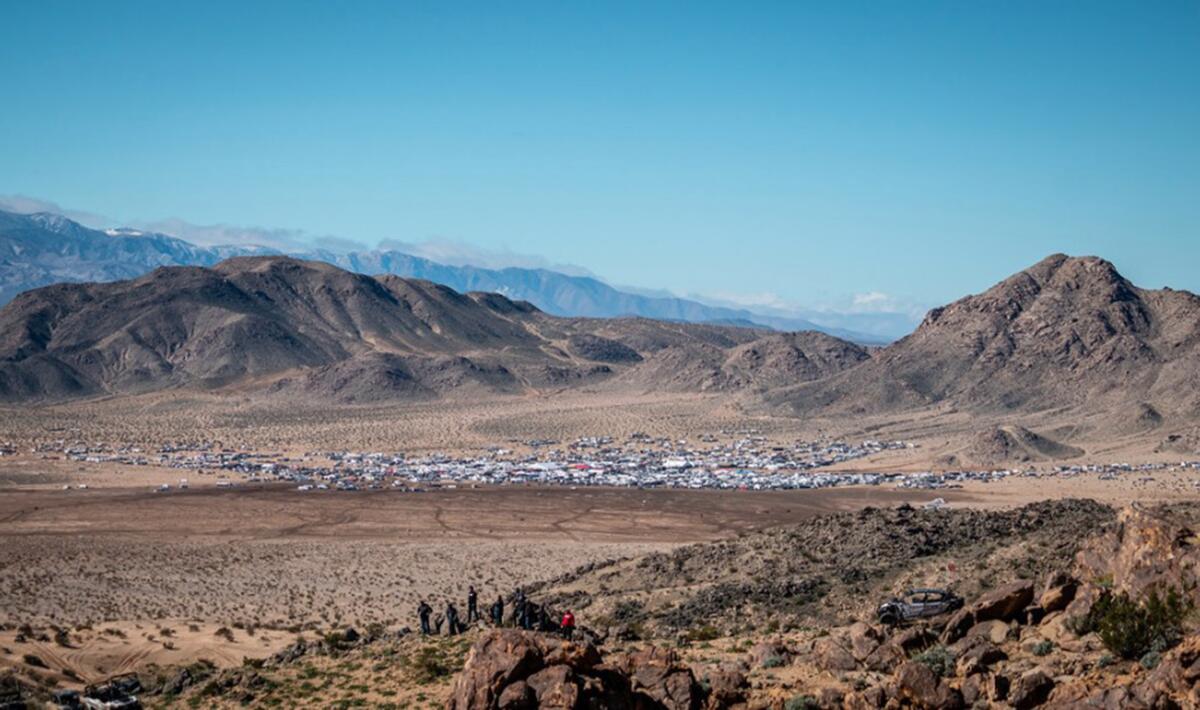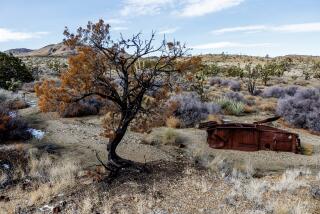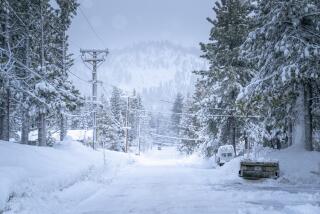Column: Desert off-road festival to go ahead despite violating state guidelines

Every year, tens of thousands of people descend on a rough stretch of desert north of Joshua Tree for a weeklong off-roading festival and series of extreme races.
Billed as one of the toughest desert off-roading races in the nation, the King of the Hammers event is often described as part Burning Man and part “Mad Max.”
During the event, Hammertown — a temporary city complete with named “streets,” generators, team garages and food and vendor booths — rises over a dry lakebed. Hulking, souped-up vehicles traverse the rough terrain of Johnson Valley, an off–highway vehicle riding area run by the federal Bureau of Land Management.
With a brutal pandemic still raging, an untold number of people have had to put large weddings and funerals, in-person schooling and many other facets of normalcy on hold. But the King of the Hammers, a beloved event in the off-roading community, will go on.
On Thursday morning, the Bureau of Land Management approved this year’s operational plan, meaning the massive multi-day event will begin later this month. King of the Hammers is set to run from Jan. 28 through Feb. 6, with operational support from local, state and federal agencies, including the San Bernardino County Sheriff’s Department, the Bureau of Land Management and the California Highway Patrol. (The agencies will be reimbursed for their services, as is typical with this kind of large-scale event.)
In a statement, King of the Hammers founder Dave Cole said they had “worked hard to ensure that we can continue to operate in a safe and responsible manner and have gone above and beyond some of the current standard guidelines. ... We don’t take this lightly and know that an entire ecosystem of people and businesses are relying on the motor sport and aftermarket automotive equipment industry to stay healthy.”
Despite state guidance “strongly” discouraging travelers from coming to California for nonessential purposes, racers, pit crews and fans from across the country will converge in Southern California, where the coronavirus is particularly rampant, before returning to their respective home states.
It’s still unclear exactly how many people will be gathering in Johnson Valley in two weeks. The Bureau of Land Management was not able to answer repeated queries regarding this year’s expected King of the Hammers attendance numbers, despite having signed off on an operational plan for the event on Thursday morning.
Alan Johnson, the vice president of marketing and communications for Ultra4 Racing, the sanctioning body behind the event, said it was anticipating “considerably fewer people than in past years,” when around 50,000 spectators attended. Johnson said that as of Thursday evening, just under 1,500 spectator tickets had already been pre-sold, and 482 drivers were registered. Those numbers do not include the legions of vendors, staffers, sponsors, media members, volunteers and pit crew members who help put on the event. The average pit crew is about four people per car, according to Johnson. If every driver brings a pit crew, that would account for roughly 1,920 more attendees.
Neither Johnson nor the Bureau of Land Management answered questions about whether there was a cap on the number of potential attendees.

The event has been given explicit approval from the San Bernardino County Public Health Department.
San Bernardino County currently falls under the state’s purple tier, the most restrictive, which means coronavirus transmission is considered to be widespread and many nonessential businesses are closed. On average, 94.7% of intensive care beds in the county were occupied during the seven-day period beginning on Jan. 1, according to L.A. Times data.
On Dec. 5, San Bernardino County Public Health Director Corwin Porter issued a statement saying, “the COVID-19 response plan that King of the Hammers and MedNext staff devised is comprehensive, thoughtful, and puts into place mitigation measures that address my concerns from a healthcare perspective.”
Speaking on Thursday, San Bernardino County spokesman David Wert confirmed that the county’s public health director stands by his December statement. “The organizers of the event have outlined an extraordinary slate of precautions,” Wert said, characterizing the plan as “nothing like the county has ever seen for an event of any kind.”
As referenced on its website, the event’s COVID mitigation plan begins with a one-sentence paragraph: “Access to the 2021 King of the Hammers event will NOT require COVID Testing.”
It goes on to clarify that temperature checks will be required at the event’s main gate, and protocol will be slightly stricter for those inside Hammertown, with required on-site or pre-event COVID-19 testing for admission. Testing will also be required for drivers, co-drivers, staff, media and vendors.
Positive antibody test results, which are by no means an absolute guarantee of immunity, will be accepted to enter, as will negative COVID-19 tests taken up to seven days prior to arrival. While a seven-day-old COVID-19 test offers a pretty good picture of whether someone had transmissible levels of the virus seven days ago, it doesn’t do much for preventing transmission a week later.
“I am very, very concerned, as are a lot of locals,” said longtime Joshua Tree resident Becky Boyer-Whitehurst. The 70-year-old retired educator said she was particularly worried about the influx of people and the potential strain on local hospitals. “Our town is usually packed the weekend that they’re here,” she said.
Hi-Desert Medical Center, the nearest hospital to the event, is caring for its largest number of COVID-19 patients since the beginning of the pandemic, according to Todd Burke, the California communications director for hospital operator Tenet Healthcare. Burke said that although the hospital is licensed for four ICU beds, it is operating in surge capacity, with an average of seven ICU patients a day.
Boyer-Whitehurst said that she and others in the community didn’t understand why this event was continuing “when all other large events have been canceled due to the COVID pandemic.”
Wert, the San Bernardino County spokesperson, said the event is “in compliance with the current guidelines and state health order.”
In an emailed statement, Bureau of Land Management spokesperson Michelle Van Der Linden said the county of San Bernardino and the Bureau of Land Management’s California Desert District had worked together to determine that the planned public health safeguards were “sufficient to allow the event to take place on public land.” The statement also said that the event would be in accordance with the state’s regional stay-at-home order because “professional sports on outdoor racetracks are permitted with certain mitigation measures in place.”
While the state’s regional stay-at-home order does allow for outdoor racing, it specifies that training and racing must occur without “live audiences.”
As recently as Thursday afternoon, King of the Hammers was seeking additional volunteers to help with “crowd control at spectator areas” on its Facebook page. In that same post, event organizers said large crowds were expected in multiple high-profile spectator areas.
The California Department of Public Health said it had not issued an exemption for live audiences at the event.
When asked for clarification on how an event with thousands of live spectators would be in accordance with state guidelines, Wert said people had to take into account that state parks with off-road recreational areas remain open and “each of them see tens of thousands of visitors each weekend, under no kind of regulation whatsoever.” The San Bernardino County spokesperson suggested the upcoming event would be a safer alternative to what was already going on.
But a spokesperson for California State Parks contradicted that assessment.
“State Parks staff on the ground report that SVRAs [State Vehicular Recreation Areas] are not currently experiencing tens of thousands of visitors on a typical weekend,” Jorge Moreno, a California State Parks information officer, said in an emailed statement. “Additionally, events are not taking place in the State Park System until further notice.”
What we have here is a near-perfect crystallization of the failures of California’s pandemic response. Amid the deadly peak of a once-in-a-century pandemic, individuals have been left with wildly conflicting guidelines from various levels of government.
The rules seem arbitrary because they are. It’s hard to argue otherwise when thousands of people are planning to gather for a weeklong off-roading festival, while thousands of kids in the nearest high desert school district are still struggling through Zoom lessons. Support for the event won’t just come from local and federal agencies: Officer Casey Simmons of the Morongo Basin office of the California Highway Patrol said the agency would be assisting with traffic control for King of the Hammers, as it has in years past.
Yes, the event goes against state guidelines, but it will be put on with the active involvement of a state law enforcement agency. Meanwhile, elected officials continue to push messages of do-your-part personal responsibility as our hospital system teeters at the breaking point.
More to Read
Start your day right
Sign up for Essential California for news, features and recommendations from the L.A. Times and beyond in your inbox six days a week.
You may occasionally receive promotional content from the Los Angeles Times.







